In the days following Israeli Prime Minister Benjamin Netanyahu’s revelation that it had extracted “half a ton” of documents, photographs and simulations evidencing the scale of Iran’s sophisticated underground nuclear-weapons program, pundits and supporters of the Iranian nuclear deal, known more formally as the Joint Comprehensive Plan of Action (JCPOA), seem to be downplaying the findings.
Among the most common challenges is that the data presented by Israel—collected surreptitiously painstakingly by the Mossad—evidences nuclear development prior to the deal’s signing and does not prove that Iran has violated the terms of the deal that it signed.
Israeli Prime Minister Benjamin Netanyahu and the Israeli establishment disagree, contending that Iran’s lying about the scope and intentions of their nuclear-weapons program invalidates the deal from the outset. Newly confirmed U.S. Secretary of State Mike Pompeo, who indicated prior to Netanyahu’s bombshell that U.S. President Donald Trump was likely to leave the JCPOA agreement this month, has seconded Netanyahu’s assertion that the documents expose Iranian intentions.
“For many years, the Iranian regime has insisted to the world that its nuclear program was peaceful. The documents obtained by Israel from inside of Iran show beyond any doubt that the Iranian regime was not telling the truth,” Pompeo said in a statement following Netanyahu’s presentation.
Indeed, “not coming clean is a big violation,” says David Wurmser, a former Mideast adviser to former Vice President Dick Cheney and special assistant to John R. Bolton at the State Department. “Right off, Iran clearly is in violation if it did not come clean in 2015.”
Wurmser explains that that the flaws in the deal from the outset are only compounded by new revelations about how advanced the nuclear program already is.
“The issue is not whether Iran is violating the deal,” he says. “The issue is whether the JCPOA was an exercise in delusion which needs to be jettisoned.
“The absence of anything in the deal which addressed the weaponization and delivery aspects—or genuinely scrubbed all the outstanding issues revealed over the years—exposes the deal as dangerous and defective,” Wurmser tells JNS.
He goes on to explain that the deal was premised on reports on Iran’s nuclear program by the International Atomic Energy Agency, and notes that “the JCPOA is not the only measure of compliance.” Regardless of the actual deal, Iran is signatory to IAEA statutes limiting nuclear weaponization.
Under the IAEA inspections regime, the director general of the IAEA does not have to prove violation, but only needs to determine that he cannot with confidence certify compliance to declare a state in not good standing,” notes Wurmser. “The statutes of the IAEA automatically kick in then when the director general says he cannot certify [compliance], and the issue then is bumped to the U.N. Security Council. That it also ignored critical elements—and the IAEA closed the file—without Iran’s full disclosure is a very serious affair and violation.”
Wurmser further contends that among the many flaws of the JCPOA is that it “inverted” the burden of proof that Iran has been violating its obligations to the international community, “rather than the burden being on Iran to prove compliance.”
‘Post-2015 pieces of information left unrevealed’
Echoing statements by Netanyahu, Wurmser contends that the main problems with the deal itself remain in place even if Iran had come clean about its nuclear aspirations at the outset of negotiations and never violated any of the JCPOA provisions—making the deal completely untenable for Israel or the United States, which should be committed to ensuring that Iran never has capacity to produce nuclear weapons.
“The issue is not that Iran is violating the agreement, but that Iran has a path to a bomb through the agreement without violating it,” says Wurmser. “Also, I suspect there are post-2015 pieces of information which were left unrevealed.”
In addition to the revelations about Iran’s nuclear program, efforts by supporters of the deal—who by and large are supporters of former U.S. President Barack Obama and opponents of Trump—to moderate the findings reveal something further about the JCPOA.
“In essence, what is on trial here is not only Iran and the deal, but the crafters of the JCPOA—the elites whose Weltanschauung it reflects—and the crisis of commitment to reality afflicting the previous U.S. leadership and most of the current European leadership,” purports Wurmser. “If reality and sobriety is jettisoned in matters of the life and death of nations, then the accrued agreements built on those delusions become inherently flawed.
“The JCPOA is not a treaty, but an agreement among a policy community discredited by their willful suspension of sobriety and reality.”
Meanwhile, Trump has until May 12 before he will decide whether the JCPOA can be fixed, or whether the United States will effectively withdraw from the agreement and renew its sanctions regime on Iran.
“That said,” affirms Wurmser, “I think we are already beyond the JCPOA.”


























